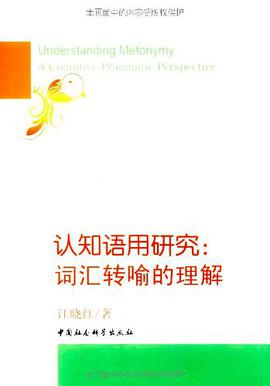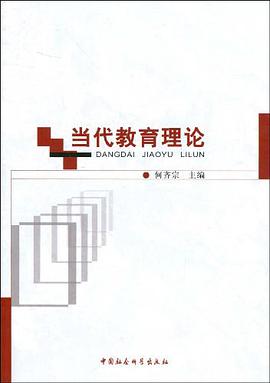
具体描述
《认知语用研究:词汇转喻的理解》在吸收和融会语用学与认知语言学相关研究成果的基础上,以新颖、独特的视角,就汉语中的词汇转喻进行认知语用框架下的专题研究,探讨了转喻理解的制约因素、认知语用机制以及认知效果等问题,提供了在认知语言学和语用学之间寻求联系与统合的可能性,拓展了转喻研究的新思路。
作者简介
江晓红,四川泸州人,广东肇庆学院副教授、博士。2008年毕业于广东外语外贸大学外国语言学及应用语言学专业,获文学博士学位。主要研究兴趣为语用学、认知语言学和应用语言学。近年来在各类学术期刊发表学术论文20余篇;出版专著1部,参编著作4部;曾参与教育部人文社科重点研究基地重大研究项目“词汇语用学——英、汉语言中词汇使用与理解”,目前正主持广东省哲学社会科学“十一五”规划项目“英汉词汇转喻的认知语用研究”。
目录信息
Chapter One Introduction 1.1 The importance of metonymy in verbal communication 1.2 The target of research 1.3 Rationale of the research 1.4 Objectives of the study 1.5 Methodology for the research 1.6 Organization of the dissertationChapter Two Review of the Relevant Literature 2.1 Introduction 2.2 Structuralist views 2.3 The perspective of cognitive semantics 2.3.1 Reference-point phenomena 2.3.2 The idealized cognitive model 2.3.3 Meaning elaboration 2.4 The pragmatic approach 2.4.1 Previous pragmatic accounts of metonymy 2.4.2 A preliminary relevance-theoretic account of metonymy 2.5 The limitations in current accounts of metonymyChapter Three A Description of the Conceptual Framework 3.1 Introduction 3.2 The delimitation of metonymy for the present study 3.2.1 Linguistic realization of metonymy 3.2.2 The working definition of metonymy 3.2.3 Distinguishing metonymy from metaphor 3.3 Theoretical foundations 3.3.1 Relevance theory 3.3.2 Cognitive semantics 3.3.3 The complementarity of cognitive semantics and relevance theory 3.4 The characterization of the conceptual framework 3.4.1 Constraints involved in metonymy recognition 3.4.2 Comprehension heuristics employed in metonymy interpretation 3.4.3 Cognitive effects achieved in metonymy interpretationChapter Four Constraints on Metonymy Recognition 4.1 Introduction 4.2 Syntactic constraint: syntactic deviations 4.3 Semantic constraint: violations of selection restriction 4.4 Cognitive constraint: cognitive principles of relative salience 4.4.1 Human experience 4.4.2 Perceptual selectivity 4.4.3 Cultural preferences 4.5 Pragma-cognitive constraint: the constraining influence of context 4.5.1 Dynamic context 4.5.2 Mutual manifestness 4.6 ConclusionChapter Five Ad hoe Concept Construction of Metonymy 5.1 Introduction 5.2 Lexical pragmatics and ad hoe concept construction 5.3 The "transfers of meaning" issue 5.3.1 Reference transfer 5.3.2 Contextual variability of word meaning 5.4 An alternative solution to "transfers of meaning" 5.4.1 Cracking contiguity relations of metonymy 5.4.2 A refined relevance-guided comprehension heuristics 5.4.3 A cognitive pragmatic interpretation of metonymy: an application 5.5 Reference transfer and beyond 5.6 ConclusionChapter Six Cognitive Effects of Metonymy in Utterance Interpretation 6.1 Introduction 6.2 Economy considerations 6.3 Contextual implications 6.3.1 A trade-off between cognitive effort and cognitive effects 6.3.2 Highlighting of associative relations 6.4 Poetic effects 6.4.1 Strong and weak implicature 6.4.2 Speaking the unspeakable 6.4.3 Achieving interpersonal effects 6.5 ConclusionChapter Seven Conclusion 7.1 Major findings 7.2 Implications 7.2.1 Philosophical implications: sense and reference 7.2.2 Linguistic implications: semantics-pragmatics distinction 7.2.3 Logical implications: ways of inference and utterance interpretation 7.3 Suggestions for further studyBibliography后记
· · · · · · (收起)
· · · · · · (收起)
读后感
评分
评分
评分
评分
评分
用户评价
评分
评分
评分
评分
评分
相关图书
本站所有内容均为互联网搜索引擎提供的公开搜索信息,本站不存储任何数据与内容,任何内容与数据均与本站无关,如有需要请联系相关搜索引擎包括但不限于百度,google,bing,sogou 等
© 2026 qciss.net All Rights Reserved. 小哈图书下载中心 版权所有





















